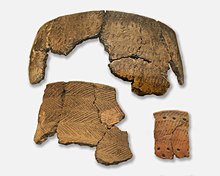shard
The term shard (from Middle High German schërbe , also schirbe , "fragment, shard; pot") originally describes a broken ceramic part (pottery shard, porcelain shard). In ancient times, the shard played a role as a mark (because of the accuracy of fit in the corresponding counterpart) or a cheap carrier of short inscriptions , for example as a voting vehicle at the shard court , for writing samples or in administration.
Found shards are used to more precisely determine the epoch of the finds in archaeological excavations.
Pieces of broken glass are also referred to as (glass) shards.
Idioms
Some idioms deal with broken glass.
- The saying shards bring good luck is often quoted when a vessel is broken to comfort over the loss. An old wedding ceremony, the hen party , during which a lot of dishes are smashed, possibly belongs in this context .
- Standing in front of the shards of his life means that all hopes have been destroyed. Likewise: standing in front of a pile of broken glass.
See also
Web links
Commons : Shards - collection of images, videos and audio files
Wiktionary: Shard - explanations of meanings, word origins, synonyms, translations
Individual evidence
- ↑ Jürgen Martin: The 'Ulmer Wundarznei'. Introduction - Text - Glossary on a monument to German specialist prose from the 15th century. Königshausen & Neumann, Würzburg 1991 (= Würzburg medical-historical research. Volume 52), ISBN 3-88479-801-4 (also medical dissertation Würzburg 1990), p. 169.
